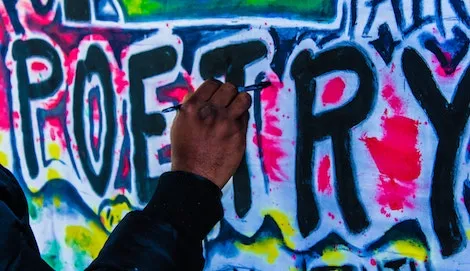
Poets for the Terrified
I have a confession to make. For a long time, I didn’t really get poetry. I successfully managed to hide this through an English degree, my postgrad studies, and several years as a literature tutor.
I liked poetry when I was a child. There was a lot of fantastic children’s poetry out there, and I devoured all the Michael Rosen and Benjamin Zephaniah I could get my hands on. But then I got older, and the poems we read at school changed. There were still several that I loved, for the language they used or the stories they told, but there were others that I just didn’t get. I couldn’t see the rhythm, or how they held together, although I realised that they did. When I tried to write my own versions, I ended up
doing that thing
where you just split up
a sentence
and pretend it’s a poem
although that never really works
But lately, I’ve been getting back into poetry. I started reading poets whose work, while still strange and beautiful and intricate, seemed to invite me in rather than spinning me around and shutting me out.
First up was Bridget Minamore, who I saw perform at QUILTBAG Cabaret, a much-missed LGBTQ arts night in my old home town of Oxford. Minamore is a powerhouse. She’s worked with organisations from the Royal Opera House and the BBC to charities such as My Body Back, who support sexual violence survivors. And her poetry is full of wit and warmth, the words sparking and zipping as she performs.
Next was Lucy Ayrton, another poet whose words I first heard at QUILTBAG Cabaret. Ayrton’s poetry walks the fuzzy line between verse and storytelling. She has several poetry shows under her belt, including Lullabies to Make Your Children Cry, and her wry exploration of tragedy, High On the Storm Torn Coast. My favourite, though, is still the sweet, simple love poem she read at QUILTBAG, about finding a person who can make you believe in dinosaurs.
The third of the three poets who got me reading poetry again is Rachel Plummer, whose upcoming collection is the first book of poetry that I’ve ever pre-ordered. Aimed at teens and young adults, Plummer’s Wain takes Scottish myths and retells them through an LGBTQ lens. I first heard about Plummer’s work when one of the poems from the collection, Selkie, was the centre of a huge amount of transphobic backlash which seemed to have completely missed the point of this beautifully-written piece. A secret boy selkie who swaggers like a mermaid was the story I didn’t know I needed to hear, and now I have, I can’t wait to read more.
So, now I’ve dived back into poetry’s deeps, I want to read more. Which poets would you recommend?
If, like me, you’re looking to broaden your horizons in contemporary poetry, have a look at 15 Stanzas to Make You Fall in Love with Contemporary Poetry. Feeling a little romantic? Then try 18 Love Poetry Books to Fall Head Over Heels For.








